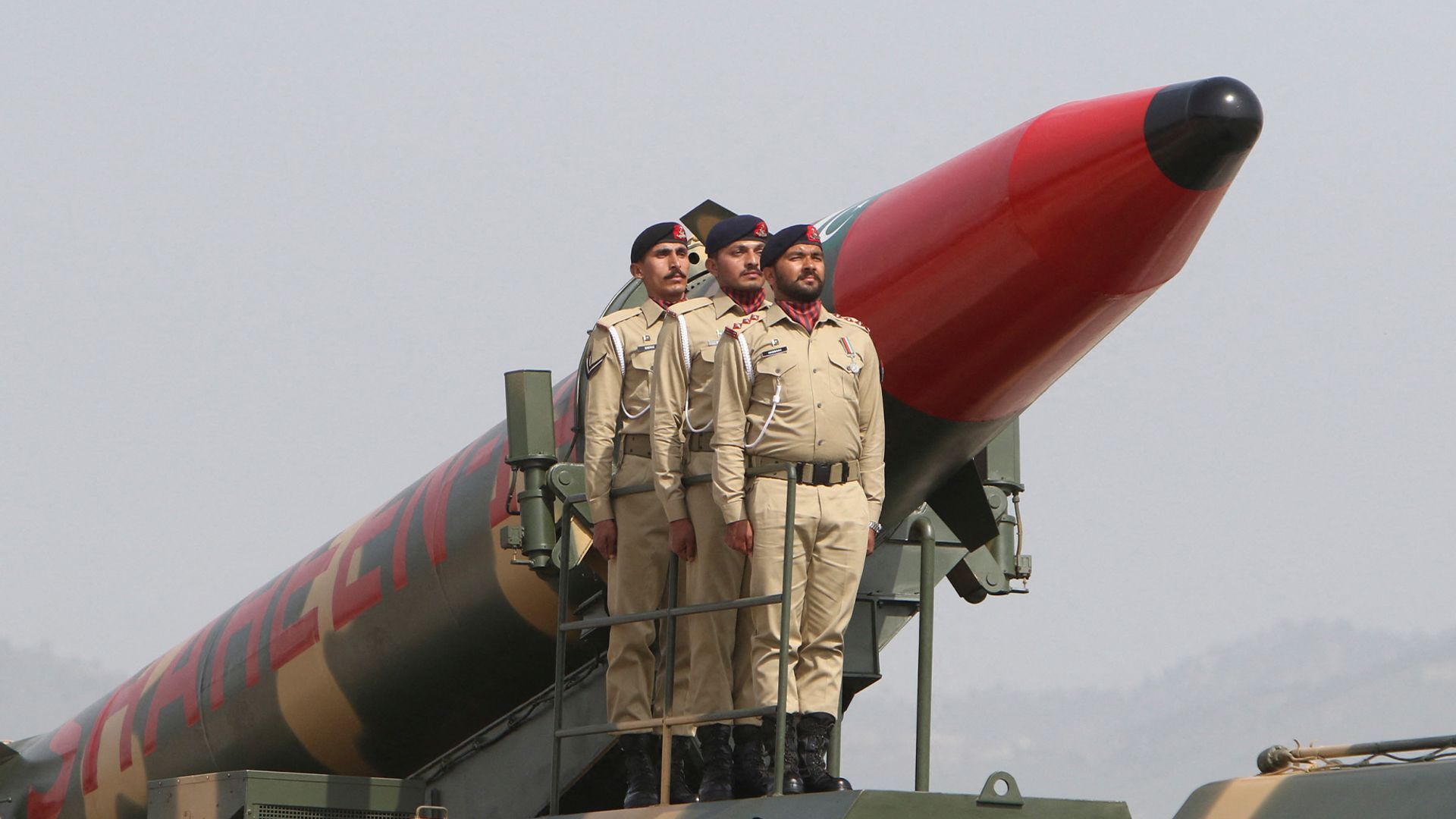
Pakistan’s long-range missile plans raise alarm in Washington
By Ryan Robertson (Anchor), William Jackson (Producer), Bast Bramhall (Video Editor)
The Biden administration has raised concerns about Pakistan’s development of long-range ballistic missiles, warning that the program could eventually create a capability to strike the United States. Officials released intelligence about the program and imposed sanctions on entities linked to it, citing failed diplomatic efforts to address the issue.
Media Landscape
See how news outlets across the political spectrum are covering this story. Learn moreBias Distribution
Left
Right
Untracked Bias
Deputy National Security Adviser Jon Finer described the program as an “emerging threat” to the U.S., pointing to Pakistan’s work on advanced missile systems and testing equipment for larger rocket motors.
Finer emphasized that the list of countries with nuclear weapons and long-range missile capabilities targeting the U.S. is limited and typically adversarial, making Pakistan’s actions particularly worrisome.

Download the SAN app today to stay up-to-date with Unbiased. Straight Facts™.
Point phone camera here
The U.S. sanctioned Pakistan’s state-owned National Development Complex, which oversees missile development, including the Shaheen ballistic missile program. The State Department also imposed sanctions on three Karachi-based companies and Chinese entities supporting Pakistan’s missile efforts.
Pakistan’s government dismissed the U.S. claims, calling them unfounded and designed to hinder its ability to defend against India. Analysts suggest the missile program may aim to deter U.S. involvement in potential conflicts with India or complicate efforts to disarm Pakistan’s nuclear arsenal.
Islamabad’s nuclear weapons program has historically focused on countering India, with which it has fought three wars.
Officials estimate Pakistan’s ability to develop missiles capable of reaching the U.S. could take a decade. However, the White House stressed the urgency of addressing the issue now to prevent further progress.
Relations between the U.S. and Pakistan have strained in recent years, partly due to Washington’s closer ties with India and Islamabad’s growing alignment with China.
[Ryan Robertson]
PAKISTAN IS TRYING TO DEVELOP LONG-RANGE BALLISTIC MISSILES THAT COULD ONE DAY HIT THE UNITED STATES. THE BIDEN ADMINISTRATION SAYS THIS IS OBVIOUSLY VERY CONCERNING, SO IT’S RELEASING SOME INTELLIGENCE ABOUT THE PROGRAM, AND PUTTING SOME NEW SANCTIONS IN PLACE ON GROUPS LINKED TO IT. STILL, THERE ARE PLENTY OF QUESTIONS REMAINING ABOUT THE IMPLICATIONS FOR REGIONAL STABILITY AND U.S.-PAKISTAN RELATIONS.
DEPUTY NATIONAL SECURITY ADVISER JON FINER DESCRIBES THE SITUATION AS AN “EMERGING THREAT” TO THE U.S., CITING PAKISTAN’S WORK ON ADVANCED MISSILE SYSTEMS AND TESTING EQUIPMENT FOR LARGER ROCKET MOTORS.
THE WHITE HOUSE SAYS IT’S DISCLOSING THE INTELLIGENCE ABOUT PAKISTAN’S ACTIVITIES ONLY AFTER DIPLOMATIC EFFORTS TO ADDRESS ITS CONCERNS FAILED. OFFICIALS SAY PAKISTAN ISN’T GIVING AN EXPLANATION AS TO WHY IT’S PURSUING THIS CAPABILITY. FINER SAYS THE LIST OF COUNTRIES WITH NUCLEAR WEAPONS AND LONG-RANGE MISSILE CAPABILITIES TARGETING THE U.S. IS SMALL AND ADVERSARIAL, MAKING PAKISTAN’S ACTIONS PARTICULARLY CONCERNING.
THE U.S. IS IMPOSING SANCTIONS ON PAKISTAN’S STATE-OWNED NATIONAL DEVELOPMENT COMPLEX, WHICH OVERSEES MISSILE DEVELOPMENT, INCLUDING THE SHAHEEN BALLISTIC MISSILE PROGRAM. THE STATE DEPARTMENT IS ALSO TARGETING THREE PAKISTANI COMPANIES IN KARACHI AND CHINESE ENTITIES SUPPORTING PAKISTAN’S MISSILE EFFORTS.
PAKISTAN’S GOVERNMENT IS DENYING U.S. CLAIMS, CALLING THEM UNFOUNDED AND AIMED AT HINDERING ITS ABILITY TO DEFEND AGAINST INDIA. SOME ANALYSTS SUGGEST PAKISTAN IS TRYING TO DEVELOP LONG-RANGE MISSILES IN ORDER TO DETER THE U.S. FROM GETTING INVOLVED IN ANY FUTURE CONFLICT WITH INDIA. ANOTHER THEORY IS PAKISTAN WANTS TO COMPLICATE EFFORTS TO DISARM ITS NUCLEAR ARSENAL.
EARLY ESTIMATES SAY PAKISTAN COULD DEVELOP MISSILES CAPABLE OF REACHING THE U.S. IN ABOUT A DECADE, BUT THE WHITE HOUSE IS STRESSING THE NEED TO ACT NOW IN ORDER TO PREVENT FURTHER PROGRESS. RELATIONS BETWEEN THE U.S. AND PAKISTAN BECAME STRAINED IN RECENT YEARS, PARTLY DUE TO WASHINGTON’S CLOSER TIES WITH INDIA AND ISLAMABAD’S GROWING ALIGNMENT WITH CHINA.
FOR MORE OF OUR UNBIASED, STRAIGHT FACT REPORTING – DOWNLOAD THE STRAIGHT ARROW NEWS APP TODAY, OR LOG ON TO SAN.COM.
Media Landscape
See how news outlets across the political spectrum are covering this story. Learn moreBias Distribution
Left
Right
Untracked Bias
Straight to your inbox.
By entering your email, you agree to the Terms & Conditions and acknowledge the Privacy Policy.
MOST POPULAR
-
 AP Images
AP Images
Trump’s Department of Justice removes database tracking police misconduct
Read13 hrs ago -
 Reuters
Reuters
New coronavirus discovered in bats similar to COVID-19
Read14 hrs ago -
 AP Images
AP Images
Pope Francis in critical condition with asthma-like respiratory crisis
Read15 hrs ago -
 Getty Images
Getty Images
DOJ investigating UnitedHealth over Medicare Advantage billing: Report
Read17 hrs ago




